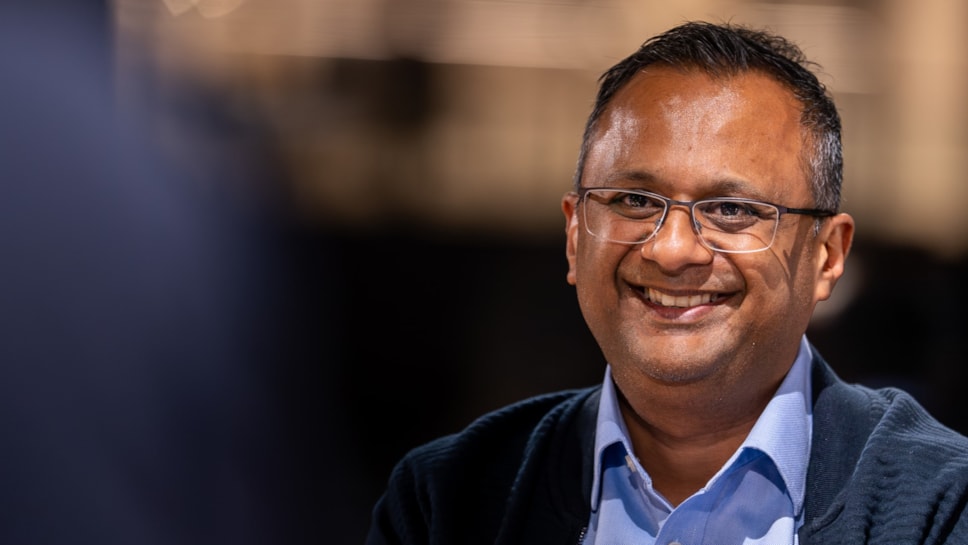
‘It’s about making a difference to people’ – at the heart of affordable and sustainable energy strategy
The latest in our series of profiles highlighting the people and innovations across E.ON. Chetan Lad is Head of Strategy for E.ON UK, part of a team blending sustainability and affordability into the energy future.
“I've been blessed to be involved in work that's made a difference. Ultimately, we have a real opportunity to do good things. We're making a real difference to people's lives. That's great.
Chetan Lad says he owes his career in the energy industry (24 years and counting) to a few ‘sliding doors’ moments that have each brought new experiences and opportunities. But it is his childhood in working class Greater Manchester which continues to shape his responses to the challenges of ordinary people – and which still drives his priorities when leading the strategy of one of the UK’s leading energy companies.
As Head of Strategy at E.ON UK, Chet's role is multifaceted. He helps the Board to make informed decisions about the company's future direction, bringing in market insights, shaping strategies that align with the company's values, through to engaging with external experts and supporting business units as they bring that vision to customers.
Whether it is a view of the energy world three to five years out, or analysing longer-term considerations out to 2050, Chet says E.ON’s strategy team emphasise the need to include social purpose into what is offered to customers, especially vulnerable households. Right now that means a particular focus on flexibility and battery storage, areas he believes are crucial when it comes to the twin challenges of affordable and sustainable energy.
He believes the benefits of the energy transition must reach everyone, not just those who can afford the latest technologies. “The energy transition can't just be for people who live in big-detached houses with solar panels and electric cars," he says. “The question needs to be how can we make it work for everyday people.”
Chet's story begins in Tameside, Greater Manchester, and a family with roots in India and East Africa. His mother and father worked at a nearby biscuit factory. Early experiences in a deprived area instilled in him a deep empathy for those struggling with energy costs.
“I know what it's like from growing up, living in a house where we didn't have central heating, where we just had gas fires in a 100-year-old Victorian house with no insulation and leaky windows," he recalls. “So I know what it feels like.”
From a primary school that was 95% black and ethnic minority children, to a former grammar school that was the exact opposite, Chet says he was “really lucky” to go on to Oxford University to read biochemistry.
“It wasn’t my background at all. Being brown, northern and working class is very different, and I definitely stood out.”
He adds: “I wasn’t sure on what I wanted to do when I was young, apart from a general desire to help improve the world. I did a degree in biochemistry, choosing that in the mid-90s when the opportunities to cure AIDS, Malaria, or solve world hunger all seemed possible.”
Despite such lofty ambitions, the real world of work in biochemistry wasn’t quite the same and Chet “accidentally” ended up in a string of roles across the energy industry, with some major global companies, as an independent consultant, and then leading the Mayor of London’s energy crusade.
His past work involved the Renewables Obligation to support the UK’s burgeoning wind generation fleet, delivering hundreds of millions of pounds in energy efficiency improvements for homes, the Feed-in Tariff to inspire domestic solar installs, and also the Government’s Green Deal scheme – these are all areas where Chet has seen his efforts bear fruit.
“These are all things that I've got my fingerprints all over . . . actual bits of legislation that I helped to shape and influence. It's a source of pride.”
But his vision for the future of energy is one where sustainability and affordability go hand in hand.
He calls out initiatives such as the Coventry affordability trial as a way of helping households who need it to get lower bills, as well as getting people engaged in the energy transition. Similar projects include E.ON’s strategic investment in Australian company Allume, helping those living in flats and other shared housing to benefit from solar energy in a way they haven't previously been able.
It’s these “win-win” solutions that Chet says benefit both the environment and the more vulnerable members of society.
“If you look at what we're doing at E.ON,” he says, “We're doing it slightly different from everyone else. A lot of our propositions have this social purpose at their heart. You can see there's real heart and values through this organisation. I've been trying to figure out where it comes from. I think it's got to come from the DNA of the organisation.”
Outside of work, Chet is a husband and father of two young daughters, chair of governors at his eldest daughter’s primary school, and likes to keep fit by running on his local country trails. He’s also a keen music fan. For our chat on a sunny Friday afternoon, he is literally rocking an Ozzy Osbourne t-shirt and reminiscing on “one of the best days of my life” – the Black Sabbath farewell concert which would turn out to be Ozzy’s own finale.
Legacy is a word that has been used a lot since then, and Chet is clear about what he wants his to be: “I have always been driven by wanting to improve the world. That's just the way that I’m wired. I want to leave a positive impact. I see the fight against climate change as one of the great challenges for humanity and I've been blessed to work in that area, in sustainable energy, for 21 years.”


